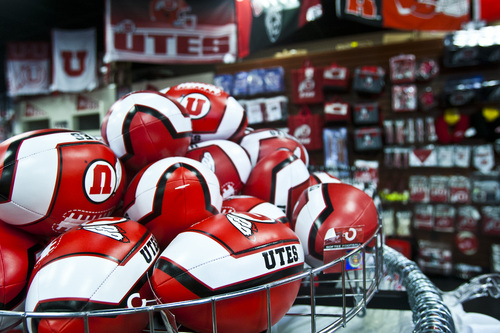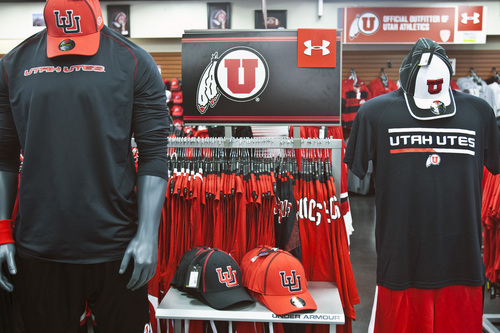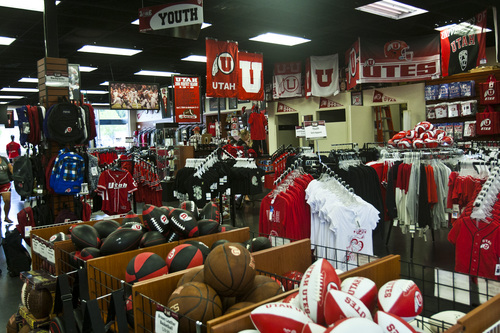This is an archived article that was published on sltrib.com in 2014, and information in the article may be outdated. It is provided only for personal research purposes and may not be reprinted.
Drawing boos from some local sports fans, the University of Utah will close its Red Zone stores following a legislative audit that found the shops unfairly compete with for-profit businesses.
"We expect to phase out the Red Zone stores," said U. president David Pershing. "We don't want to be in competition with the private sector."
The three stores will be closed as their leases run out over the next two to three years, according to a university spokeswoman. They sold about $1.9 million worth of U.-insignia merchandise like hats and sweatshirts during fiscal 2013, according to the July audit. The first off-campus store opened in Sandy in 2010, followed by a second in Layton the following year and a third in West Jordan in 2012. Combined revenues at the three locations more than doubled during that time.
"These sales totals demonstrate the potential sales revenue lost by private businesses from the presence of off-campus Red Zone stores," the audit stated. The U. doesn't pay income tax on its Red Zone profits. While the audit says the stores didn't get an exception to the rule against marketing to the general public and recommends they stop outside advertising, it doesn't propose closing them.
Some Utah athletics fans reacted bitterly to the news Thursday.
"The Red Zone stores are unique," said Ben Leaver, a dentist in Farmington and U. alum. "They fill a niche that nobody else is competing in."
Leaver said that other Utah stores do not offer the breadth of goods that Red Zone stores do, and that going online doesn't compare to browsing in a physical store. He recently found a leather wallet with a U. insignia at the Layton Red Zone that he would have never thought to look for online.
"I really like the experience of walking in and seeing what there is out there," he said.
The U.'s decision to close Red Zone stores is at odds with their response to the July 2013 audit, in which Vice President of Administrative Services Arnold Combe argued that "private retailers didn't offer the variety and selection our fans wanted," that the stores paid property and sales taxes, and that more than two-thirds of the stores' 170 employees were students. Utah Red Zones do not receive subsidies from taxpayers or student tuition and fees, he wrote, and the sale of insignia-bearing merchandise is necessary to offset the operating costs of the University Campus Store (or Bookstore). Combe cited other Pac-12 Conference schools who operate off-campus apparel stores: Arizona, Oregon and Washington all have five, he said.
Rep. Johnny Anderson, R-Taylorsville, who requested the audit, said his request came at the urging of the Office of Legislative Auditor General, who told him that higher education institutions might be doing some things that violate their own policies and those of the Board of Regents.
"It sounds like the University of Utah has made the decision that it would be better to close the stores than to comply with the policies," he said.
The July 2013 legislative audit also dinged other ways public higher education facilities, like weddings at Rice-Eccles Stadium or corporate events at Utah State University, offer similar services as for-profit businesses. Last week, the state Board of Regents adopted new rules barring advertising such services outside of the "campus community," which includes prospective students and alumni as well as students and faculty. Exceptions to that rule require a written policy on how they plan to avoid edging out private businesspeople. The revisions, however, do not require the closure of the Red Zone stores.
The new policy bars schools from advertising their services outside their website, Facebook page or social media. It also sets up a process for businesses to file a grievance if they feel a college enterprise has an unfair edge.
"There will be a place businesspeople and citizens can go if they feel there is something out of bounds," said David Buhler, commissioner for higher education. "Having it on a local level makes a lot of sense."
The changes, which also carry a directive to keep a more active eye on college and university enterprises, could forestall the Utah Legislature passing new legal requirements governing the stores.
"The Legislature could still weigh in, but I think we've done what they asked us to do," Buhler said.
Anderson said he doesn't feel the U. should be trying to generate its own revenue. Rather, he said, "They should be looking at tuition, fees, and quite frankly, taxpayer support. If we're not willing to support a government agency with tax dollars, then you have to question, why would that service be in need?"
U. spokeswoman Maria O'Mara said some of the stores were profitable while others weren't.
"Overall, as a whole, the stores are pretty much a wash economically," she said. "It's important to note that they were never set up to be profit centers, but to get university products and merchandise to people who asked for them."
Twitter: @lwhitehurst
Twitter: @matthew_piper







